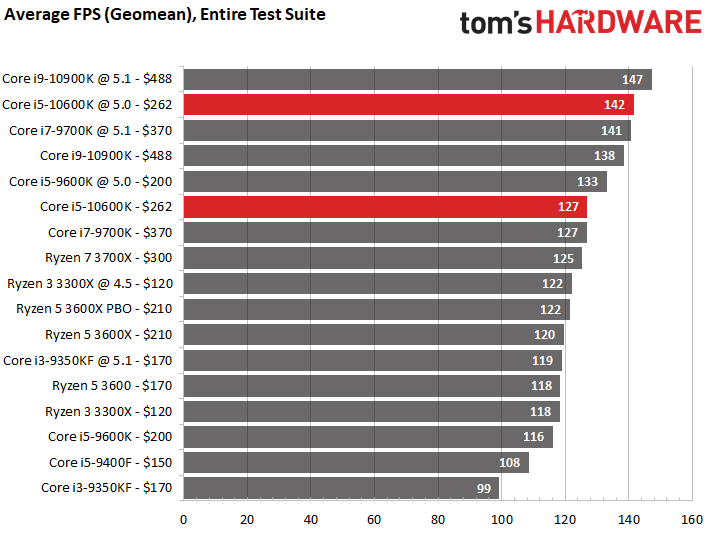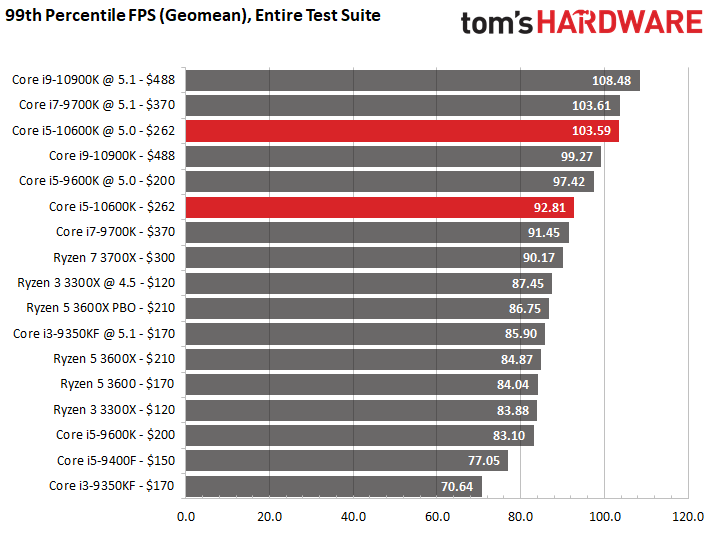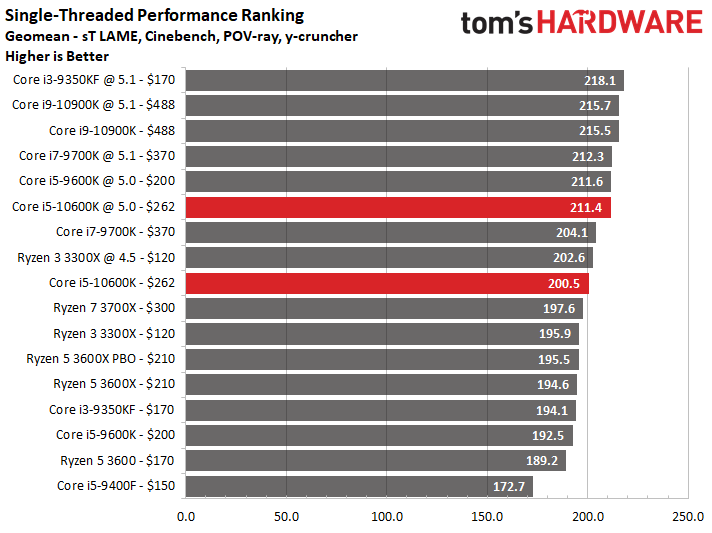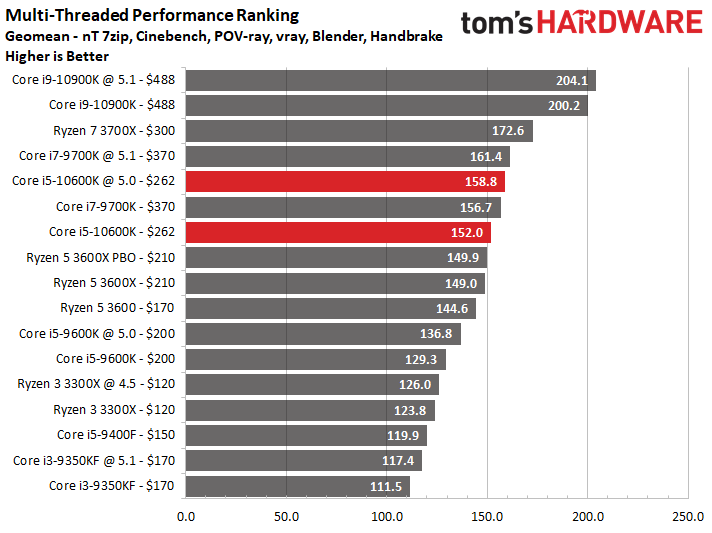Why you can trust Tom's Hardware
AMD's Ryzen 3000 series processors upset the established pecking order in the high-volume mid-range, beating Intel's competing chips by huge margins in productivity-focused work while delivering similar, or slightly better, gaming performance at the most important price points.
Intel's Comet Lake response helps reduce that imbalance with a heavier slathering of threads that improve its standing in productivity work and multi-tasking, accompanied by higher clock rates that carve out a perceptible lead in gaming workloads. In fact, dropping $262 on the Core i5-10600K gives you comparable performance to Intel's $370 Core i7-9700K that debuted last year.
In the chart below, we plot gaming performance using average frame rates and a geometric mean of the 99th percentile frame times (a good indicator of smoothness), which we then convert into a frames-per-second measurement. Bear in mind that we tested with an Nvidia GeForce RTX 2080 Ti at 1920x1080 to alleviate graphics-imposed bottlenecks. Differences between our test subjects shrink at higher resolutions. We've included the Core i9-10900K in these charts to highlight its position relative to the Core i5-10600K.




At stock settings, the Core i5-10600K runs neck-and-neck with the Core i7-9700K throughout our gaming test suite, and overclocking grants it the slimmest of leads despite its 100 MHz deficit. Meanwhile, AMD's Ryzen 7 3700X puts up a good show with comparable performance at stock settings, but at a higher price point. Focusing on the price-comparable Ryzen 5 3600X and 3600, the Core i5-10600K enjoys a comfortable lead in both average fps and smoothness metrics, and overclocking opens up a tremendous gap. Remember, you can also opt for the graphics-less KF model for $237 and get identical performance.
Overall, the Core i5-10600K convincingly offers up the best gaming performance in this price range. We expect gamers to pair a chip of this class with less-expensive GPUs, but that extra bit of performance will be useful if you plan on upgrading to next-gen GPUs like AMD's Big Navi and Nvidia's Ampere.
Flipping over to the geometric mean of our application testing suite, we see that Intel has made great strides in eliminating the massive disparity between its Core i5 series and AMD's Ryzen 5 in multi-threaded applications. The overclocked Core i5-9600K falls far behind the stock 10600K, and overclocking pushes the 10600K far ahead of the 9600K and AMD Ryzen 5 chips alike. A quick look at the stock 9600K's standing against Ryzen 5, not to mention the 10600K, highlights just how much improvement Intel made by enabling Hyper-Threading and increasing clock rates.
As expected, the Intel Core i5-10600K maintains Intel's performance lead across the broad spate of our single-threaded tests, which will manifest as snappy performance in a wide variety of tasks.
Get Tom's Hardware's best news and in-depth reviews, straight to your inbox.
Intel's Core i9-10900K is an impressive piece of silicon, cementing the company's overall lead in gaming performance. But its high power consumption requires expensive accommodations, particularly on the cooling side. And the chip doesn't leave much overclocking headroom for enthusiasts with conventional cooling setups.
In contrast, the Core i5-10600K consumes an acceptable amount of power given its performance and 14nm++ process, and you can top it with affordable off-the-shelf coolers and receive the full performance. That's due in part to Intel's thicker copper IHS and thinner die, which also helps unlock more frequency headroom from the Core i5-10600K. That equates to strong gains in gaming, meaning overclocking is still alive and well in this price range. Our overclocking efforts were a breeze, and you could carve out respectable overclocks with a brawny air cooler, or shoot for the edge with 240mm or greater AIOs.
AMD's competing chips come with bundled coolers and a lower price of entry and are attractive for productivity-focused users, helped by overclocking support with all but the A-series motherboards, and you can opt for a previous-gen motherboard that doesn't support PCIe 4.0. Support for the faster PCIe 4.0 interface remains one of AMD's advantages over competing Intel processors, so you do lose part of the value proposition if you take that route.
Many of the high-end Intel's Z490 motherboards are pricey, largely due to in-built support for PCIe 4.0 that you won't be able to use until the next generation of chips, and the LGA1200 platform looks to be short-lived. You can opt for lesser boards at the cost of sacrificing overclockability.
Overall, Intel's Core i5-10600K offers better gaming performance than the Ryzen 5 processors and minimizes disparities in multi-threaded workloads, earning our Editor's Choice award.
MORE: Best CPUs
MORE: Intel and AMD Processor Hierarchy Comparisons
MORE: All CPUs Content
Current page: Core i7 Gaming at i5 Pricing
Prev Page Core i5-10600K Application Benchmarks
Paul Alcorn is the Editor-in-Chief for Tom's Hardware US. He also writes news and reviews on CPUs, storage, and enterprise hardware.
-
sizzling Great review but a big shame PBO is only recorded against the 3600X when based on price the alternative is the 3700X or 3800X.Reply -
thGe17 Replylastmessiah said:Too bad you can't actually buy it anywhere.
Why not? For example the two biggest online shops in DE alread sell them and also have the 10400, 10500, 10600 and 10700K available. Only the 10900 models seem to be rare. -
waltc3 Yawn...Wake me when Intel finally launches a new architecture on a decent process node...ZZZZz-z-z-z-zzzReply -
jimmysmitty I assume in the "Against" column you mean "No PCIe 4.0"? Pretty sure this has 3.0.Reply -
Chris Fetters It's official then I guess... Paul has completely lost the plot at this point. Don't get me wrong, it's a really solid chip, but the pricing (ESPECIALLY if you consider the entire platform, ala board+CPU+cooler) is absolutely freaking TERRIBLE!Reply
If you're building a gaming rig, going with a Ryzen 5 3600 & B450 (to save as much as possible, but you could spring the +$20 for B550 if you wanted) saves you enough money to go up an entire GPU tier (meaning better gaming performance!!!), and if you're building it for ANYTHING else, a Ryzen 7 3700X machine absolutely roflstomps it AND is cheaper (cheaper board + free cooler).
The only situation where this i5K makes any sense is if you're building a flagship gaming rig w/ an RTX 2080 Ti (where there's no point to saving money on the CPU for a better GPU), but at that point, why the hell are you buying an i5? You're building a mondo expensive flagship machine with 8c/16t consoles imminent, put a damn i9 in there.
TL;DR - The only kinds of builds that would benefit from buying this chip are the same kinds of builds that no sane person would ever put an i5 in... -
seanwebster I'm just shocked at how an i5 now costs $300...and without a cooler. Wow, go Intel.Reply -
King_V ReplyChris Fetters said:It's official then I guess... Paul has completely lost the plot at this point. Don't get me wrong, it's a really solid chip, but the pricing (ESPECIALLY if you consider the entire platform, ala board+CPU+cooler) is absolutely freaking TERRIBLE!
If you're building a gaming rig, going with a Ryzen 5 3600 & B450 (to save as much as possible, but you could spring the +$20 for B550 if you wanted) saves you enough money to go up an entire GPU tier (meaning better gaming performance!!!), and if you're building it for ANYTHING else, a Ryzen 7 3700X machine absolutely roflstomps it AND is cheaper (cheaper board + free cooler).
The only situation where this i5K makes any sense is if you're building a flagship gaming rig w/ an RTX 2080 Ti (where there's no point to saving money on the CPU for a better GPU), but at that point, why the hell are you buying an i5? You're building a mondo expensive flagship machine with 8c/16t consoles imminent, put a damn i9 in there.
TL;DR - The only kinds of builds that would benefit from buying this chip are the same kinds of builds that no sane person would ever put an i5 in...
Generally agreed, EXCEPT for the "lost the plot" part. This is supposed to mostly be testing the performance of the CPU itself.
Don't get me wrong, I agree that the cost of the motherboard, cooler, etc., are definitely important considerations, but, as yo usaid, the CPU is solid.
It's a great chip with some lousy baggage in terms of cooler and motherboard. Uh, and it does run hot.